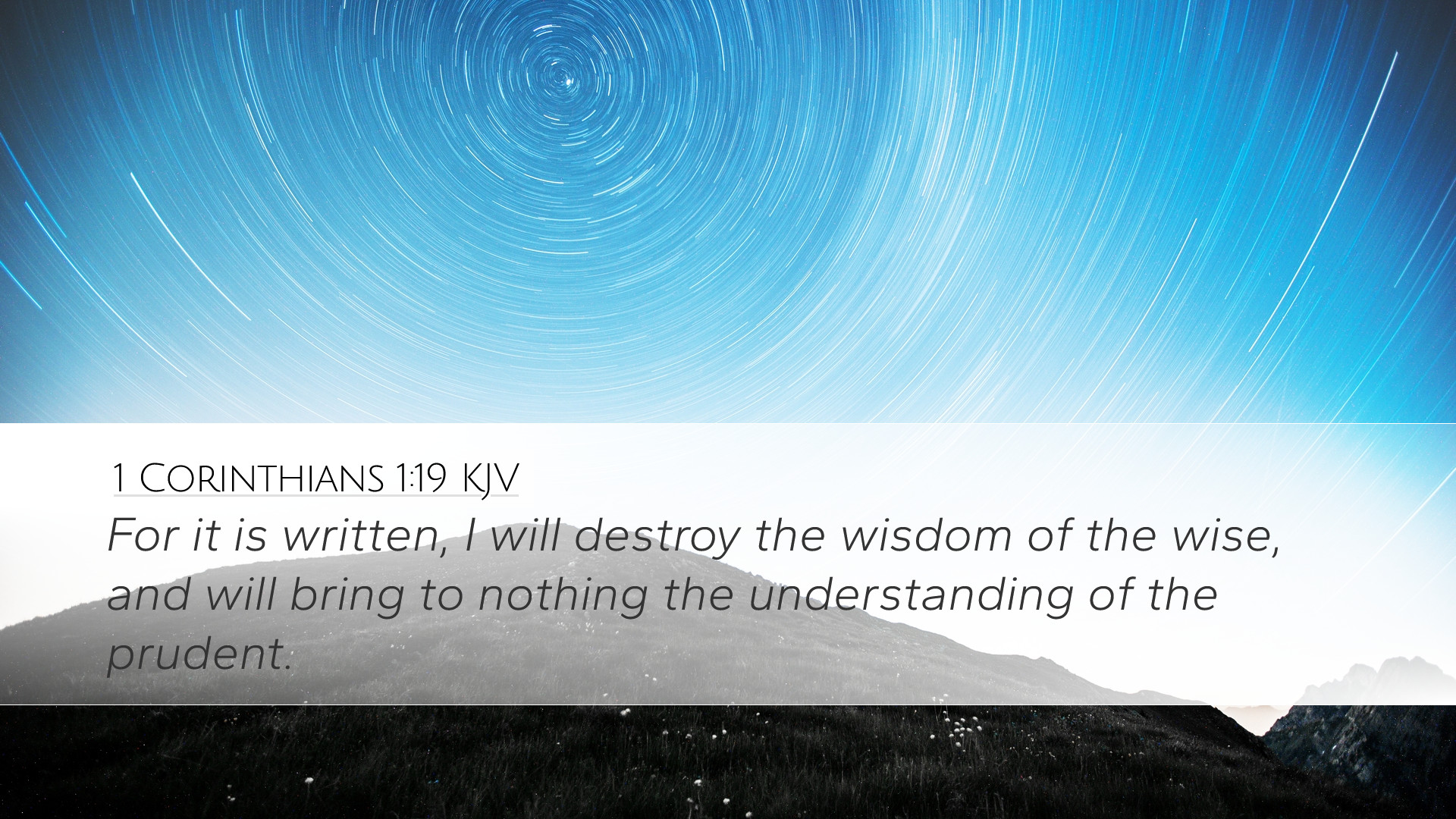Commentary on 1 Corinthians 1:19
“For it is written, I will destroy the wisdom of the wise, and will bring to nothing the understanding of the prudent.”
Introduction
This verse serves as a crucial part of Paul's argument in 1 Corinthians, establishing the theme of divine wisdom versus human wisdom. As we delve into the insights provided by public domain commentators, we shall discern the meaning and implications of this profound statement within the context of the early Corinthian church and its challenges.
Contextual Analysis
Paul writes to the Corinthians who were grappling with divisions and varying philosophies. The Corinthians were heavily influenced by the Greek culture, which prized wisdom and rhetoric. Paul counters this notion by invoking a prophecy from Isaiah, emphasizing the ultimate futility of human wisdom in comparison to God's wisdom.
Matthew Henry's Insights
Matthew Henry, in his commentary, reflects profoundly on the futility of human wisdom. He notes:
- Divine Judgment on Earthly Wisdom: Henry emphasizes that God's intention is to render the so-called wisdom of the wise as foolishness. The “wisdom of the wise” refers to worldly philosophers who rely on human reasoning and understanding.
- God's Sovereignty: This verse reveals God's sovereignty in determining what is valuable and true. The wise of this world often dismiss God's ways as foolishness, but Paul asserts that it is they who will be brought to nothing.
- Application to Believers: Henry urges believers to recognize the limitations of human wisdom and rely instead on divine revelation and guidance. This wisdom from above is essential for navigating spiritual truths.
Albert Barnes' Commentary
Albert Barnes offers a detailed examination of this verse, encouraging readers to consider the broader implications:
- Nature of Human Wisdom: Barnes outlines that human wisdom is often based on pride and self-reliance. Such wisdom can lead to a misunderstanding of God’s character and His ways.
- Isaiah’s Prophecy: Citing Isaiah 29:14, Barnes echoes that God will turn the wisdom of the human mind into folly. He emphasizes that no human reasoning can thwart God’s plans or purposes.
- Revelation of Christ: Barnes concludes that the revelation of Christ—a stumbling block for the Jews and foolishness to the Greeks—uppersets conventional wisdom by offering a path to salvation that defies human logic.
Adam Clarke's Exegesis
Adam Clarke provides a comprehensive analysis that adds depth to the meaning behind Paul’s message:
- Theological Implications: Clarke discusses how this verse reflects a central theme of Pauline theology: salvation through the foolishness of the cross. This challenges the wisdom of both Jew and Greek.
- Human Limitations: Clarke emphasizes the limitations inherent in human understanding. God's wisdom transcends human capabilities, illustrating the juxtaposition of divine and worldly perspectives.
- Existential Reflection: He encourages believers to embrace this paradox—what seems foolish to the world is, in fact, the depth of divine wisdom. This calls Christians to live by faith rather than sight.
Theological Reflections
The insights drawn from these commentaries converge on a few crucial theological reflections:
- God’s Revelation over Human Reason: The passage emphasizes that divine wisdom unveiled through Scripture and the Cross cannot be fully comprehended through human faculties.
- Challenge to Cultural Norms: The verse serves as a challenge to modern believers who may still be tempted to seek approval and wisdom according to worldly standards.
- Foolishness as Strength: There is an inherent paradox in the Christian faith; what is perceived as weak or foolish in the eyes of the world has the power to transform lives.
- Response to Sectarianism: The divisiveness in Corinth is an allegory for modern issues wherein churches may prioritize human wisdom or cultural relevance over the gospel's message.
Practical Implications for the Church
Given the insights garnered from these commentaries, there are several practical implications for modern church practice:
- Cultivate Humility: Church leaders and members must cultivate a heart of humility, recognizing their dependence on God's wisdom rather than their own understanding.
- Preach the Cross: Emphasizing the message of the Cross should remain central to teaching and preaching, reminding the congregants that God’s ways are often contrary to human expectations.
- Address Challenges to Faith: Leaders should equip believers to address the philosophical challenges and skepticism prevalent in a post-Christian culture.
- Witness to the Wise: The church must be a witness not only to the lost but also to the wise of this age, demonstrating the transformative power of God’s wisdom through action and lifestyle.
Conclusion
1 Corinthians 1:19 encapsulates a significant theological truth that continues to resonate throughout history. The insight of public domain commentators enriches our understanding and provides a multifaceted perspective on how God’s wisdom challenges and ultimately overcomes the limitations of human reasoning. Pastors, students, theologians, and scholars are called to reflect deeply on this verse and allow it to inform their faith and practice in the context of an ever-evolving world.


